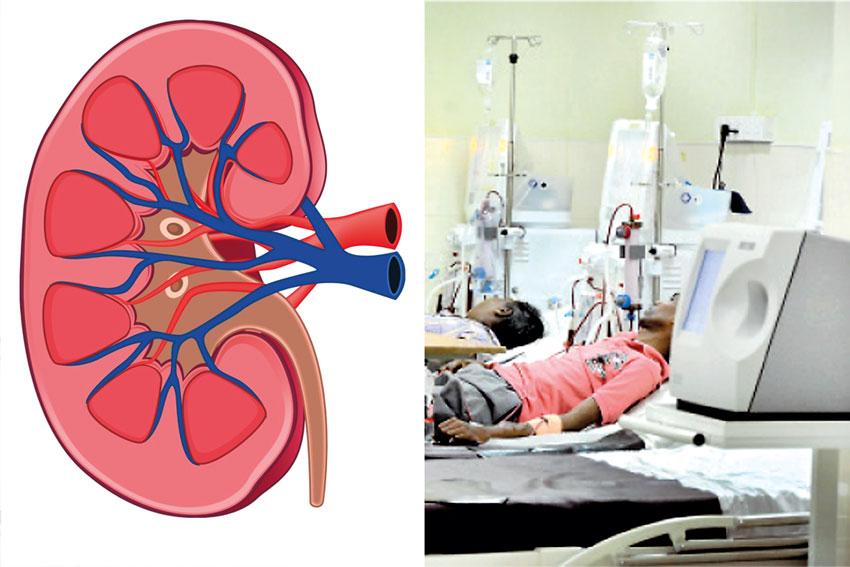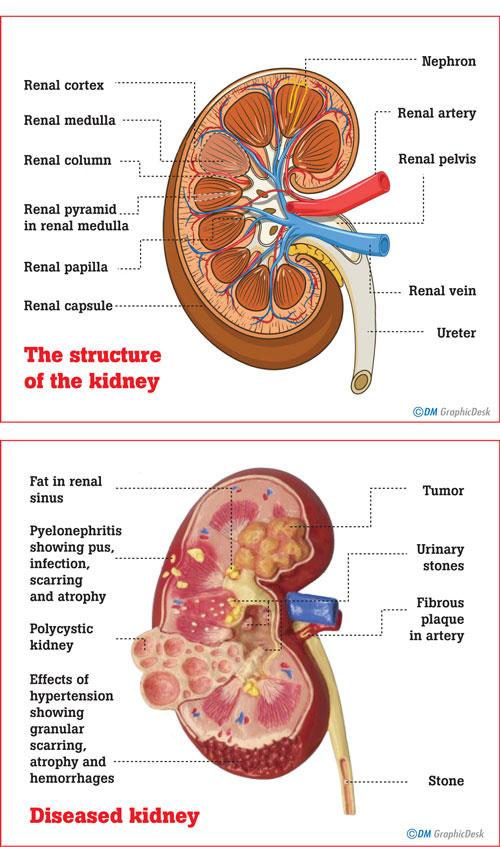13 Mar 2020 - {{hitsCtrl.values.hits}}

 Kidneys are perhaps the most underrated couple of organs in the human body. Urine production being the most commonly known fact about the kidneys, people seldom think beyond its excretory function. Ever since the groundbreaking advent of kidney transplant surgery, kidney donations to patients from live donors have become a common practice. The fact that humans can survive with one kidney alone, have embedded in common minds a notion that the kidneys are dispensable unlike organs such as the heart, the brain or the liver. Kidney-selling jokes are often made in social settings when one speaks of an expensive purchase. On the contrary, the humble kidneys are highly complex vital organs which are in no way simple and are not to be taken for granted.
Kidneys are perhaps the most underrated couple of organs in the human body. Urine production being the most commonly known fact about the kidneys, people seldom think beyond its excretory function. Ever since the groundbreaking advent of kidney transplant surgery, kidney donations to patients from live donors have become a common practice. The fact that humans can survive with one kidney alone, have embedded in common minds a notion that the kidneys are dispensable unlike organs such as the heart, the brain or the liver. Kidney-selling jokes are often made in social settings when one speaks of an expensive purchase. On the contrary, the humble kidneys are highly complex vital organs which are in no way simple and are not to be taken for granted.
World Kidney Day (WKD) is a global campaign that aims to raise awareness of the importance of the kidneys and to reduce the frequency and impact of kidney disease and its associated health problems worldwide. This campaign is a joint initiative of the International Society of Nephrology (ISN) and the International Federation of Kidney Foundation (IFKF). World Kidney Day is observed annually on the second Thursday in March, and the inaugural campaign kickstarted in the year 2006.

Kidney diseases are non-communicable diseases and currently affects around 850 million people worldwide. One in ten adults develop chronic kidney disease (CKD) and the statistics suggest a worrisome global burden, and the numbers are expected to rise to become the fifth most common cause of years of life lost globally by 2040. Chronic Kidney Disease is also a major cause of catastrophic health expenditure. The cost of dialysis and transplantation consume a significant percentage of the annual healthcare budget of most first world countries. However, in middle to low income countries, most people with kidney failure have insufficient access to lifesaving dialysis and kidney transplantations.
Kidney diseases can be prevented and progression to end stage renal disease (ESRD) can be delayed with appropriate access to basic diagnostics and early treatment. Sadly, in many countries, specific policies directed towards education and awareness about kidney disease as well as screening, management and treatment are often lacking. The awareness among the general public towards kidney related problems are also significantly less in comparison to other non-communicable diseases such as those involving the heart and type 2 Diabetes Mellitus.
This year, the World Kidney Day campaign continues to raise awareness of the increasing burden of kidney diseases worldwide and to strive for kidney health for everyone, everywhere. Specifically, the 2020campaign highlights the importance of preventive interventions to avert the onset and progression of kidney disease.
Simply stated, the kidneys are the filtration system of the human body. The kidneys are a pair of bean shaped organs that can be found on either side of the spine below the level of the ribs. They are retroperitoneal organs, meaning, they are embedded in the anatomical space behind the abdominal cavity. Each kidney is approximately about four to five inches long. Each kidney is equipped with almost a million subunits called nephrons that carry out the filtration, reabsorption, secretion and finally, excretion functions. All of the blood in the human body passes through the filtration system of the kidneys and the wastes are removed. The filtered blood remains circulating in the body, and the wastes get turned into urine. The urine is then collected in the pelvis of the kidney and drains into a tube called a ureter and is finally stored in the urinary bladder. When the bladder fills up to a reasonable capacity, the urge to urinate occurs and the waste is excreted.
The formation of urine is not merely a waste secreting process, but rather, the internal balance of the human body, including acid base regulation along with fluid and electrolyte balancing, largely depend on the kidneys. The salt, water and the mineral levels in the body are monitored by the kidney and in the event of excess or shortage of the said components, the kidneys adjust accordingly by excreting more of that component or by conserving. Thus, when excess water is consumed, water is freely filtered, adding more volume to the urine and the urine is diluted to the extent that is light in colour or colourless. In a dehydrated state, the kidney tries to conserve water, and the water in the body is held back, making the urine assume a darker colour due to its concentrated nature.
The kidneys also produce hormones that influences the functions of other organs. Erythropoietin is a hormone that stimulates red blood cell production. When a shortage of red blood cells occurs in the body due to blood loss or due to other illnesses, the kidneys detect it and produce this hormone in response, to create more red blood cells to combat the anaemic state. Hormones responsible for the overall vitamin D and calcium metabolism, and blood pressure regulation are also handled by the kidneys.
Being a vital organ that contributes to the smooth running of the human machine, the kidney too deteriorates throughout the years. Preventive care is of utmost importance to preserve the optimum functioning of the kidneys. Neglect and burdening the kidneys with poor lifestyle choices will result in incurring a higher price to pay. To maintain healthy kidneys, preventive measures must be taken, especially in those who carry high risk factors.
The risk factors for kidney diseases are high blood pressure, being diabetic, having a family history of kidney diseases, being overweight and above the age of 50 years, smoking cigarettes and being of African, Aboriginal, Hispanic or Asian origin. In Sri Lanka, Chronic Kidney Disease (CKD) of unknown origin is a major health care challenge in the Northern Province of Sri Lanka. Unlike most CKD cases, the Sri Lankan CKD is not related to diabetes or hypertension, but is predominantly observed in low income male agricultural labourers and paddy farmers. Heavy metal toxicity, genetic factors and the possible role of repeated dehydration are being considered as causes, but the findings remain debatable.
Majority of the patients with early stages of Chronic Kidney Disease go undiagnosed. The silent progression completely destroys the function of the kidneys and diagnosing at a later stage would only yield sub optimal therapeutic outcomes, even when treated vigorously. Therefore, persons with the above-mentioned risk factors are urged to take up at least a simple kidney function test.
According to the World Kidney Day prevention campaign, Primary prevention implies intervening before health effects occur in an effort to prevent the onset of kidney disease process begins. This requires modification of risk factors such as Diabetes Mellitus and hypertension, unhealthy diets, structural abnormalities of the kidneys and the urinary tracts or exposure to kidney specific toxic substances.
While kidney diseases that are secondary to other heath conditions may be prevented by lifestyle modification and carefully regulated and personalized pharmacotherapy, structural abnormalities of the kidneys can only be prevented by screening and imaging procedures. Early screening leads to early diagnosis and the treatment too would be optimal when diagnosed at an early stage.
Tertiary prevention focuses on patients who already have established kidney problems. This kind of prevention focuses on managing the illness and controlling further progression and deterioration, and preserving the quality of life of the patient.
The World Kidney Day 2020 campaign is focused on providing Kidney health for Everyone, Everywhere- from prevention to detection and Equitable access to care. As cliched it may sound, prevention is always, ALWAYS, better than cure.
21 Dec 2024 4 hours ago
21 Dec 2024 21 Dec 2024
21 Dec 2024 21 Dec 2024
21 Dec 2024 21 Dec 2024
21 Dec 2024 21 Dec 2024